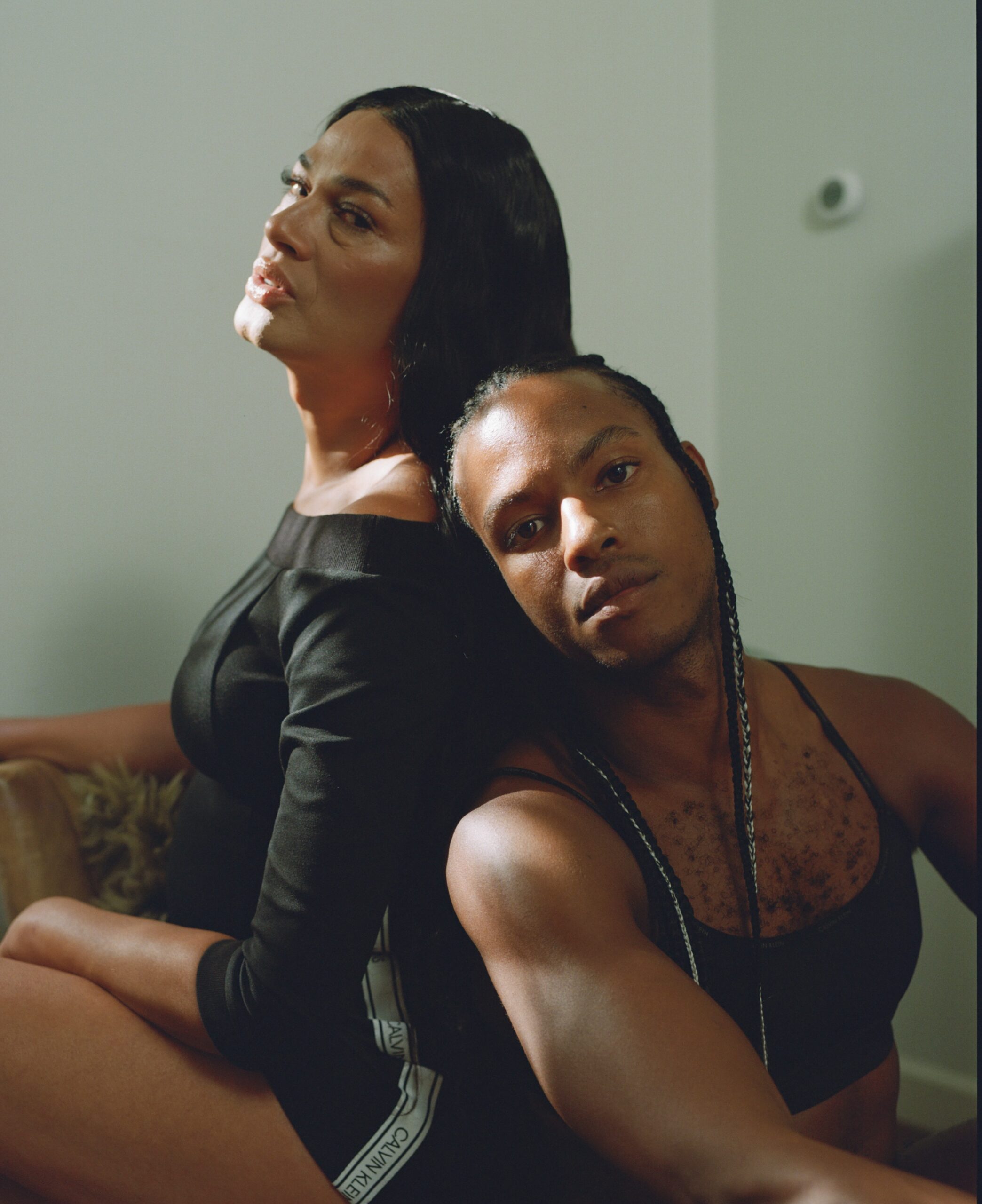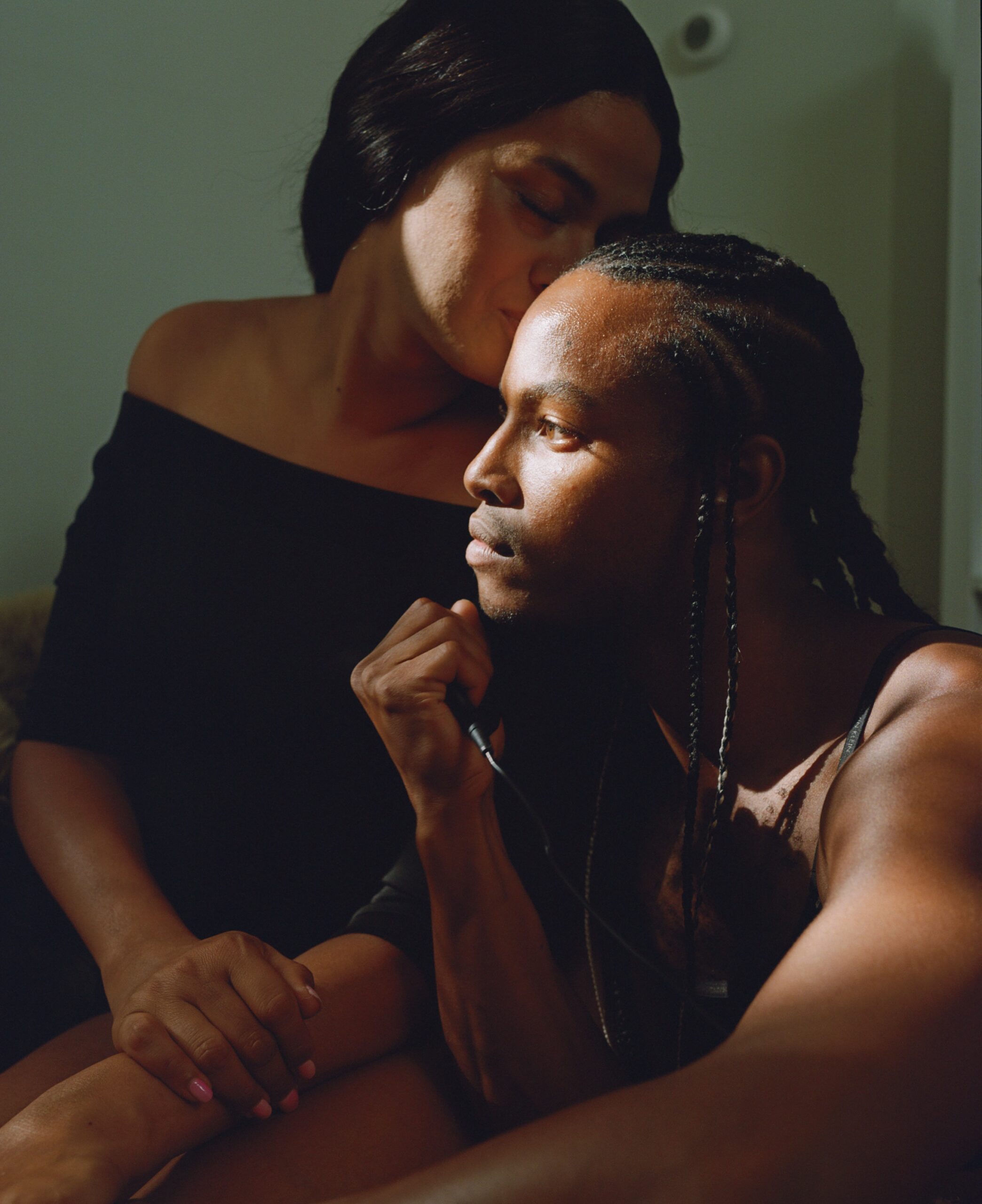A conversation with Jean Paul Paula on his latest project with Calvin Klein

In a celebration of self-expression and the beauty behind individuality, Calvin Klein, once again, leads the way with their latest (and much beloved) PROUD IN MY CALVINS project. In collaboration with Jean Paul Paula and Calvin Klein, we are so excited to share with you their newest triumph of love, family and allyship, as we build on their creative connectivity through the power of shared experience.
Stylist, artist, and creative director, Jean Paul Paula (1986, Curaçao) grew up in Almere and moved to Amsterdam in 2005, ever since we have watched the fashion-mogul develop into the icon he is today. Insatiable project, after insatiable project, Jean Paul Paula has established his leading-role in the creative industry, holding a flurry of connections to some of the best artists out there. Having worked with the biggest names in fashion, it came as no surprise to us the beauty behind the Calvin Klein project titled, no pride for some of us without liberation for all of us, in which Queer people are celebrated in a project of pure beauty and a celebration of identity. When talking to Jean Paul Paula about his latest Calvin Klein project, a clear narrative was established, the “dream of a queer future”, and it is this dream which envelops love and acceptance in a world which drastically seeks hope.
The project features eight individuals (including Paula himself), expressing their personality and identity in the honest and exquisite way only Jean Paul Paula knows how to. Reflecting on this, and the amazing people he worked with for this project, Paula explained that it is “the intersections that connect all the people that I casted connects them and the ongoing fight against racism and homophobia.” Connection, community and this intersection give hope and light to the future. Within this community, it is this information which Paula knows establishes education- the catalyst for inciting change. The story told within the work opens a conversation, and what Jean Paul Paula hopes to be an “ongoing conversation” between the viewer and those involved, as conversation ignites societal change.
Beautiful, empowering, emotive. These images are just the start! The project’s overriding goal is to “inspire people in their own respectable worlds”, working towards a future in which the intersection is the norm, particularly when it comes to brand projects and campaigns in the future. We no longer care to see token representation, or as Paula refers to it, “companies that don’t care about black people or the LGBTQA+ community to put they/them on the forefront of their brand image.” It’s time for real change and with more projects like this… we hope a new, authentic, enlightened world is coming our way.

Hey Jean Paul, it’s a pleasure to talk to you! Could you tell us a little bit about the project with Calvin Klein?
I dream of a queer future. In 2020 the world gave us good reason to be concerned about the future of human rights and access to health protections when it comes to the LGBTQA+ community instead of showing the privilege in our LGBTQA+ community. For this project with Calvin Klein, I wanted to show the reality that most of us live in the voices and faces that people choose not to see when they think about our community.
Calvin Klein is renowned for standing behind projects which allow the freedom of expression; how and why do you think this is so important right now, within our current social climate?
There are still many companies, institutions and Media are feeling the heat when it comes to exclusion and racism. If companies don’t act now they might be “cancelled” this fear is forcing many companies that don’t care about black people or the LGBTQA+ community to put they/them on the forefront of their brand image.
It’s safe to say you have been a part of many iconic shoots; what makes this one so special?
Apart from writing the concept, shooting it and styling it. I’m working with people I know personally, who I get to portray and protect.
What was it like working with such icons? And what do you feel we, as an audience, can learn from your selection of individual trailblazers.
It was truly an honour. They are all leading by example. each doing their own part in education and making space for others. I’m hoping that they inspire people in their own respectable worlds and that the intersection of having all these different conversations will inspire and influence others that see the intersections that connect with their identity.
Working with a diverse group of people right now is so important, especially uplifting this community and bringing with it a platform. What do you think can be learned from the stories shared by such talent?
The intersections that connect all the people that I casted don’t make them so different; it actually connects them and the ongoing fight against racism and homophobia. The stories that I made with them touch on topics that are an ongoing conversation for all the people involved and you and the viewer are invited to continue conversations with your friends and family.
Intersectionality often feels like a topic people shy away from due to societal oppression of binarism or singularism, how do you perceive the term ‘intersectionality’?
Intersectionality is a framework for conceptualising a person, group of people, or social problem as affected by a number of discriminations and disadvantages. It takes into account people’s overlapping identities and experiences in order to understand the complexity of the prejudices they face. In other words, the intersectional theory asserts that people are often disadvantaged by multiple sources of oppression: their race, class, gender identity, sexual orientation, religion, and other identity markers. Intersectionality recognises that identity markers (e.g. “woman” and “black”) do not exist independently of each other and that each informs the others, often creating a complex convergence of oppression. For instance, a black man and a white woman make $0.74 and $0.78 to a white man’s dollar, respectively. Black women, faced with multiple forms of oppression, only make $0.64. Understanding intersectionality is essential to combatting the interwoven prejudices people face in their daily lives.
The collaboration with Calvin Klein has an extraordinary level of honesty and authenticity, how did you make sure this was realised within the final product?
I didn’t want to ask unnecessary questions and create a basic conversation that looks like a cry for help. Everyone involved lives the hardship of being black and… lgbtqa+ and… I want to show the conversations we are having at the moment in the community even if they are uncomfortable.
The open-ness clearly is born from the creation of safe space; where have you found these spaces yourself as a creative?
I’ve had to do it myself. I’ve spent the past 6 to 7 years looking for black friends, people that are like-minded and are able to discuss our daily struggles and how we plan to make an impact and difference. Professionally, I prefer to work with people of colour, unless there is a good reason to do otherwise. Black hair and makeup artists, my assistant is a Moroccan woman with a hijab. I see it as my responsibility that everyone on set feels safe heard and seen.
Your work always carries this notion of authenticity as everything you work on runs true to who you are. How would you describe this artistic narrative?
Black. In a way, it’s the never-ending research of who I am and what my place is in the world.
In the future, what do you hope for when it comes to societal changes within fashion?
How can we get there? Everyone needs to be held accountable. From racist editors, racist schools and institutions. fashion will only reflect what society chooses to do because fashion builds off capitalism and systemic racism. In order for actual societal change, every white person in fashion should question their privilege and become aware of the structures favouring them regardless of their merit. Educating the youth is key making space at school and making sure that systemic racism is discussed and fought tirelessly
Thank you so much for talking with us today! Any parting words of wisdom in tackling today’s world?
Make sure you have a safe space with friends and family and stay woke.
Photography and creative direction by Jean Paul Paula
Make-up by Laura Yard
Featuring Sunny Jansen and Jean Paul Paula
Assisting by Fatima and Shaquille
Words by Grace Powell
Title quote by Marsha P. Johnson
#PROUDINMYCALVINS